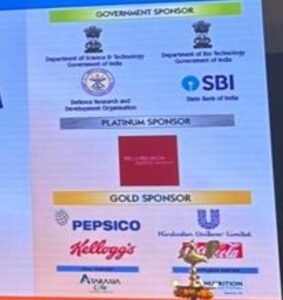Food scientists and nutrition experts are angered and shocked to see the Annual Conference of the Nutrition Society of India, a prestigious event that attracts experts and researchers from across the globe, accepting sponsorships from leading yet controversial companies in the food and beverage industry.
Companies such as PepsiCo, Coca-Cola, Unilever, and Kellogg’s are known for their extensive product lines, some of which have been criticised for their nutritional content.
“I am shocked to see that the BIG food companies are gold sponsors of the conferences of the Nutrition Society of India. It is a great disappoint that the government is part of the programme and provides legitimacy,” Dr Arun Gupta, FSSAI food scientist, tells South First.
Why is this a frowned-upon idea?
Critics argue that the involvement of these companies in funding scientific conferences can lead to a conflict of interest, potentially influencing the research agenda and the outcomes of studies related to nutrition and public health.


They worry that such sponsorships could shape the discourse in ways that favour the sponsors’ products or business strategies, regardless of the public health implications.
“This is without doubt a clear conflict of interest and must be condemned in the strongest words. I will not be able to trust anything coming out of NSI. If the government is serious about it, a Bill to prevent conflicts of interest is the call,” Dr Gupta stresses.
Experts suggested implementing strict guidelines and transparency measures to ensure that sponsorships do not compromise the scientific integrity and objectivity of the conference. This could include disclosing all sponsors and the nature of their contributions, as well as setting clear boundaries to prevent any direct influence on the conference agenda or research findings.
Sayan Deori, community nutrition expert, took to X to express his concern, “Sigh!! Looks like a corporate food system will be the agreed nutrition solutions in future with processed, fortified foods and nutribars. Wish there was basic acknowledgement and engagement with communities and their food systems.”
Sigh!! Looks like a corporate food system will be the agreed Nutrition solutions in future with processed, fortified foods and nutri bars.
Wish there was basic acknowledgement and engagement with communities and their food systems. https://t.co/a5boqUjQP5
— Sayan Deori (@sayan_deori) November 25, 2023
The contradictory sponsorship line-up has also become an international embarrassment with nutrition experts like Stuart Gillespie commentating on it on X.
He wrote, “And the Oscar for Most Conflicted Nutrition Conference of 2023 goes to….” followed by a picture of the sponsors.
And the Oscar for Most Conflicted Nutrition Conference of 2023 goes to…. pic.twitter.com/8qxek30NNH
— Stuart Gillespie (@StuartGillesp16) November 25, 2023
Also read: New study says a 7 pm dinner could change your life!
Remembering Dr Coluthur Gopalan
Meanwhile, retired scientists recalled Dr Coluthur Gopalan, who was a renowned figure in the field of nutrition and food science in India. He was a respected scientist and researcher whose work significantly contributed to the understanding of nutrition, particularly in addressing undernutrition and malnutrition in India.
Dr Gopalan was known for his principled stance on various issues, including the sources of funding and sponsorship for nutrition research. He believed in maintaining the scientific integrity of research in nutrition and public health, ensuring that it was not influenced by commercial interests that could conflict with public health goals.
A retired scientist, who did not want to be named, told South First, “The sponsors during Dr Gopalan’s time were typically companies involved in the production of laboratory chemicals and instruments, or those directly associated with nutrition research.”
He added, “This choice of sponsors reflects a strategic alignment with the scientific and research-oriented nature of the field. These companies were viewed more as partners in the scientific endeavour, contributing to the tools and resources necessary for advancing research in nutrition, rather than as commercial entities with potential for conflicting interests.”
